Marigolds are such an easy flower variety to grow – I usually just throw seeds in the ground and most of them come up each spring. But the reason I grow them every season is that they are great at helping keep pests away from the plants they grow by.
But there are pests that will eat your marigolds as well.
Do Deer Eat Marigolds?
In short, yes, deer will eat marigolds if they are hungry enough. They’ll eat most edible plants if it’s been a while since they’ve eaten.
But some varieties of marigolds are tastier to deer than others. The signet marigold is one that deer seem to stay away from, probably due to the stronger scent it puts off.
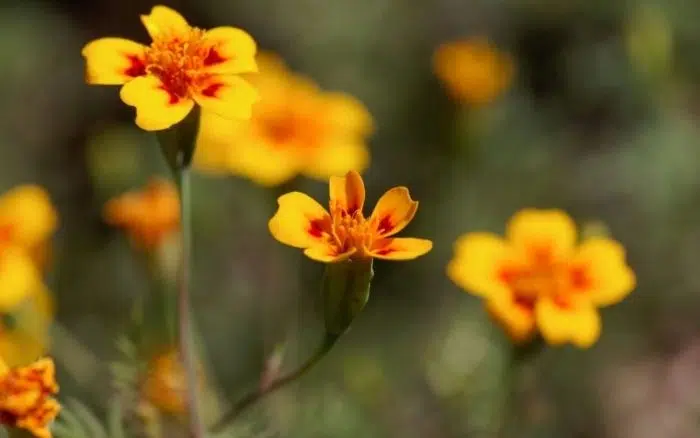
In addition, some deer might enjoy eating marigolds, while others might find them to be rather unappetizing.
If you’re concerned about deer eating your marigolds, there are some ways you can keep them from doing so. First, let’s make sure it’s a deer that is eating your plants so you can use the right methods to repel them.
How to Tell If Deer Are Eating Your Marigolds
There are a few ways to tell if a deer is the one eating your marigolds.
1. Footprints
If the ground is muddy or it recently rained, you might be able to see distinct deer footprints near the scene of the crime (i.e. your flower patch).
Deer have hooves that are separated in the middle as they appear in this picture.
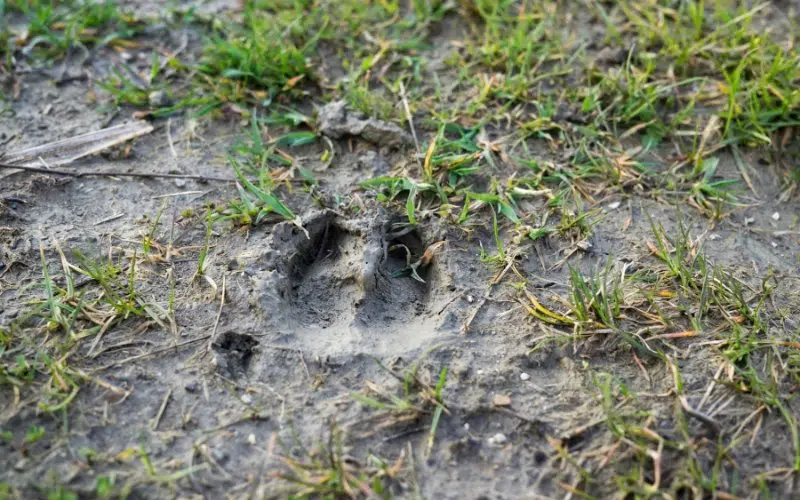
2. Flattened Nearby Plants
Deer can weigh up to 150 pounds, so they are not lightweight creatures that can get in and out without leaving some traces behind.
If you have grasses or smaller plants nearby that are just flattened as if a human stepped all over them, you’re likely looking at a deer invasion.
3. Whole Plants Are Eaten
While rabbits and other animals take small bites and don’t eat as much, deer will consume a whole plant to satiate its hunger.
If the plants damaged are fully eaten or huge chunks are missing, you are probably dealing with a deer problem.
4. Deer Scat
One of the more obvious ways to tell if deer are eating your plants is to check for droppings nearby. Deer scat is pretty easy to spot. They are usually round and in small piles, as opposed to a continuous trail like rabbit scat.
Check nearby your marigolds patch and see if you can’t find any of this to signal you’re dealing with a deer (or multiple deer).
If you find a different scat, it could be a sign that it was not deer eating your flowers.
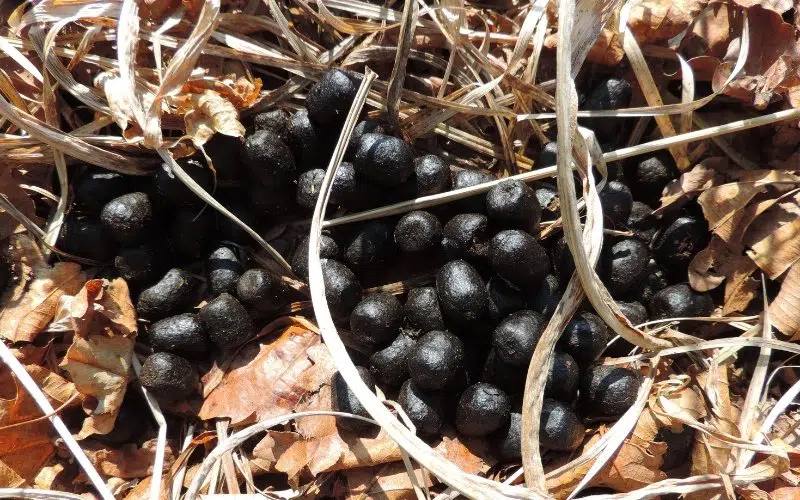
How to Keep Deer Away From Your Marigolds
Now that we know deer might be the culprit for your half-eaten (or whole-eaten) marigold flowers, how can we keep them from eating more of our vegetable gardens?
When planting marigolds outside they are especially vulnerable, so I’d recommend something like this until they are big enough to stand on their own.
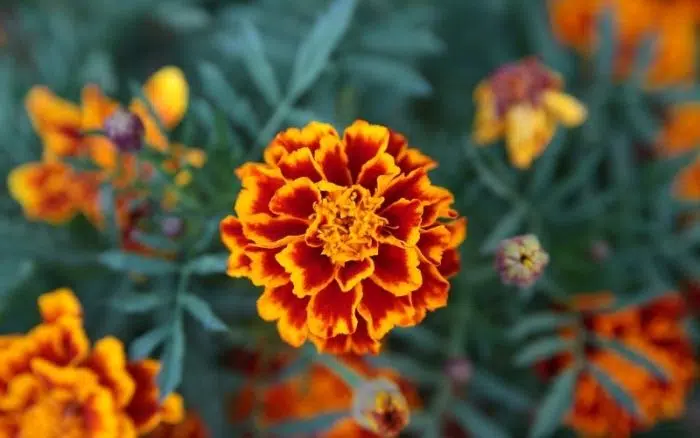
1. Fencing
Putting up a fence is probably the only deer-proof method to keep them away from your plants. However, the fence needs to be at least 8 feet tall. For many, that can be a large expense, so there are other ways to get rid of deer that are cheaper.
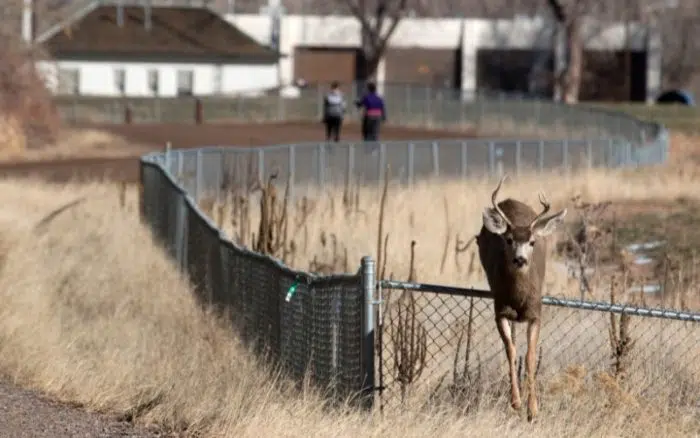
Make sure to check your fence frequently for weak spots or even a broke fence pole or post.
2. Red Cat Eyes
These solar-powered lights turn on at night and make deer and other animals think there is another predator roaming about. This simulation of a predator can help deter deer, fox, raccoons, skunks, and more.
What a genius idea! These solar-powered lights create an eerie glow in your garden to help simulate a large predator and deter:
- Deer
- Fox
- Raccoons
- Coyote
- Skunk
- Cats
3. Motion Activated Sprinkler
Motion-activated sprinklers are some of my favorite options for keeping unwanted animals out of the garden.
Deer can be very skittish. Loud noises and sudden movements usually scare them off for at least a little while.
I tested it out and it works! Here is the motion-activated sprinkler in action in my garden:
Once this sprinkler goes off, it’ll definitely have them running in the other direction. The nice part about this sprinkler is that it won’t consistently shoot in a way that animals get used to. With deer being pretty clever, they might figure out how to get around this going off, but that feature makes sure they won’t. And, your marigolds will get watered in the process.
This one even comes with a tripod for more height to scare the deer.
A motion activated sprinkler works wonders for keeping animals (and people!) out of your yard. It sprays intermittently as it detects continuous motion so animals won't get used to the timing of it.
4. Deer Repellant Sprays
There are plenty of deer repellents you can try out as well. This is the one that gets the best reviews and is made from natural ingredients including:
- Peppermint oil
- Garlic oil
- Putrefied egg solids
Now, that last ingredient should make it pretty obvious, but a lot of these deer repellent sprays smell awful, even like rotten eggs. The strong scent discourages deer from being around it.
If you’re going to eventually be eating whatever you’re trying to keep the deer from eating, either try another method or make sure you wash everything really good.
You can make your own deer repellants with any combination of chili peppers, garlic, peppermint, and other strong-smelling plant extracts. Chili pepper spray is a common one that many people swear by.
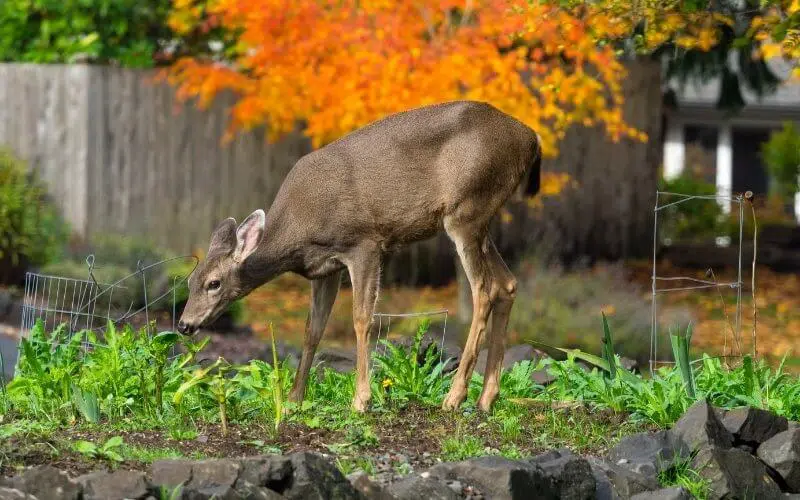
5. Deer Resistant Plants
Another method is to grow some deer-resistant plants nearby. Some of the more common plants considered to be deer resistant are:
- Almost any herb – most have such a strong scent that deer tend to steer clear of them
- Onions
- Garlic
- Scallions
- Barberry bush
- Fragrant sumac bushes
- Sagebrush
- Foxgloves
- Poppies
- Zinnias
You can also see this full list of deer-resistant plants for more ideas.
Remember, that while deer tend not to eat these, there are no hard and fast rules when it comes to nature. If a deer is hungry enough, it may just eat some of the ones on that list!
6. Deer Netting
Netting can be a great option for keeping deer and other animals from munching on your marigold seeds. However, this one is low on the list because you probably don’t want to put some netting on top of the beautiful flowers.
While it can be effective, it might not be the best option.
Garden netting helps keep animals from ravaging your garden:
- Deer
- Birds
- Squirrels
- And more
7. Irish Spring Soap
Irish Spring is a common method gardeners use when attempting to repel deer from their plants. The scent is very strong, and most deer will stay away from something that potent.
You can put a few bars into nylon stockings or old pantyhose and hang them from a stick or fence post.
8. Companion Planting
Companion planting is when you grow other plants nearby that help each other, such as helping repel certain insects that can destroy a particular crop.
Marigolds are often seen as a great companion for other herbs and vegetables because they keep a lot of pests away like aphids, a variety of moths, and spider mites.
But you can use the concept of companion planting to help keep deer from eating your marigolds as well. Deer do not like garlic, onions, and most herbs. Planting these nearby can help keep deer away.
Catnip and Russian Sage can help minimize deer damage to the garden with their strong scents.
You can also grow marigolds near your raised beds with peppermint or other pungent herbs which would give them some more height as well.
What Do Deer Generally Eat?
Deer are herbivores, so they primarily eat plants. They will consume a variety of different types of vegetation, but they have certain preferences. Deer love to eat hostas, sunflowers, and a variety of vegetables.
In the early spring when mother deer are looking for food for their young, your plants are a little more vulnerable as they need to gather a lot of food.
Are Marigolds Deer Resistant?
One thing is for sure is that some animals eat marigolds, and hungry deer are definitely one of those animals. They’ll even eat young marigold plants and can eat the whole plant if its small enough.
While they won’t eat every type of marigold, there are some they will munch on if they’re hungry.
Deer are grazers and will eat most edible plants that don’t smell bad and aren’t poisonous. It may take some testing and a combination of some of these methods to keep them away from your marigolds for good.





